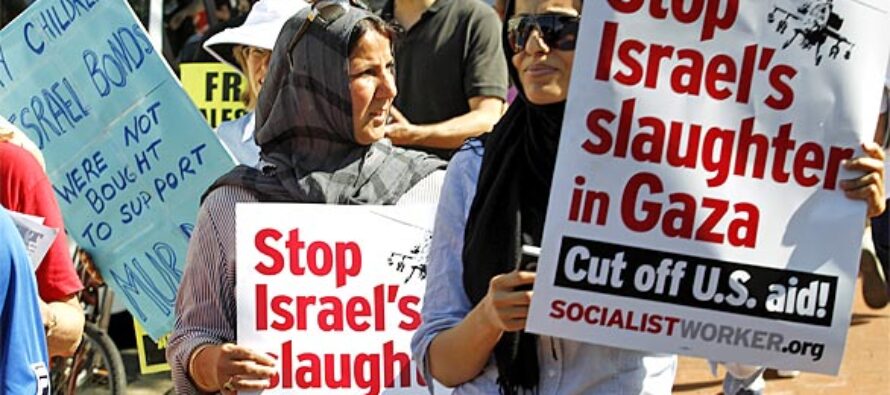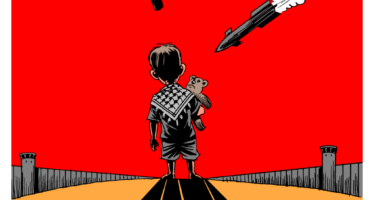Israel bows to pressure and agrees to ease Gaza blockade

![]()

Harriet Sherwood Jerusalem
Israel agreed tonight to a significant easing of its blockade of Gaza, under intense pressure from the international community after its deadly interception last month of boats attempting to break the siege.
Steps to ease the blockade will be implemented “as quickly as possible”, according to a statement issued after a meeting of Israel’s security cabinet. Tony Blair, the Middle East peace envoy authorised to broker a deal with the Israeli prime minister, Binyamin Netanyahu, issued a separate statement covering the same ground but warning that the real test would be “not what is said, but what is done”.
The aim of the new policy is to permit “civilian products for the civilian population”, Mark Regev, Netanyahu’s spokesman, said. It will include:
• A list of prohibited items to be limited to weapons and material – including “dual-use items” – that could be used in manufacturing arms. All other civilian items will be allowed to enter Gaza.
• Building materials for the Palestinian Authority and UN-approved projects to be allowed in.
• Capacity at crossing points to be increased to allow easier access.
• The policy on the movement of people in and out of Gaza to be “streamlined”.
No timetable was issued for the publication of the list of banned items.
The crucial issue of whether commercial goods will be allowed to cross into Gaza to allow the recovery of its crippled economy was not explicitly addressed in the statements. Decisions are still pending, according to an Israeli official. Blair’s office insisted that the intention was “to get the private sector going”.
Aid agencies have cautioned that concrete implementation of any relaxation of the siege could be hampered by Israeli foot-dragging. “The siege must be ended, not just eased,” said UN spokesman Chris Gunness. “Otherwise Israel continues to be in breach of international law.”
Gisha, an Israeli human rights organisation, said in a statement: “A policy consistent with international law would allow free passage of raw materials into Gaza, export of finished goods, and the travel of persons not just for ‘humanitarian’ reasons but also for work, study, and family unity – subject only to reasonable security checks.”
Ziad al-Zaza, a Hamas cabinet minister, called the Israeli move a “deception”. The blockade must be lifted completely “to allow Gaza to import all necessary materials, particularly cement, iron, raw materials for industry and agriculture, as well as import and export between Gaza and the world”, he said.
The White House welcomed the news and said Israel had responded to the international community. “Once implemented, we believe these arrangements should significantly improve conditions for Palestinians in Gaza, while preventing the entry of weapons,” said President Barack Obama’s spokesman, Robert Gibbs.
The blockade has caused a humanitarian and economic crisis in Gaza, say aid agencies, leaving 80% of Gazans dependent on handouts and leading to the closure of thousands of businesses.
The statements from the Israeli government and Blair’s office stressed the need for Israel to protect its security and demanded the release of an Israeli soldier, Gilad Shalit, held in Gaza by Hamas for the past four years.
The timing of today’s announcement may have been in part to deflect further sea-borne attempts to deliver aid to Gaza. The Israeli navy is on alert for a ship carrying female activists from Lebanon, which had been scheduled to depart at the weekend.
Israel insists it is entitled to use force to prevent any aid ships reaching Gaza. Its ambassador to the UN told Ban Ki-moon, the UN’s secretary-general, that “Israel reserves its right under international law to use all necessary means to prevent these ships from violating the existing naval blockade imposed on the Gaza Strip.”
Ehud Barak, Israel’s defence minister, warned the Lebanese government last week against authorising any flotilla. “You are responsible for the boats leaving your ports, which have the clear and stated intention of trying to break the naval blockade on Gaza,” he said.
He warned of a potentially “violent and dangerous confrontation” if any boats refused to be diverted to the Israeli port of Ashdod. Netanyahu is to meet Obama in Washington on 6 July, it was announced today. An earlier scheduled meeting to discuss the progress of fragile “proximity” talks between the Israelis and Palestinians, brokered by George Mitchell, Obama’s Middle East envoy, was abruptly called off following Israel’s assault on the flotilla on 31 May in which nine Turkish activists were killed.
Rahm Emanuel, Obama’s chief of staff, said the president was keen to “seize this opportunity” to push both sides towards a breakthrough in negotiations over a two-state solution of the conflict.
Related Articles
Gaza/Israel: Palestina declara reconocer competencia de la CIJ y solicita intervenir
![]()
El pasado 3 de junio, la Corte Internacional de Justicia (CIJ) anunció. haber recibido una declaración por parte de Palestina reconociendo la competencia general de la CIJ
War Came (to Gaza)
![]()
War came / and took the sleep from the bed / took the food from the children’s mouths / took the doctors and the hospitals / and burned them all alive.
Up to 40 dead in new Israeli atrocity
![]()
The dead is currently put at over 37 and includes a 14-year-old boy and a wheelchair-bound Palestinian protestor. More than 500 others were wounded by Israeli gunfire in an ongoing massacre




